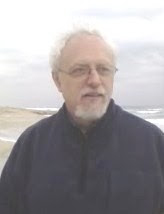
The Saturday evening before our friend, longtime peacemaker George Edwards, died I had the pleasure of spending the evening with him and his lovely wife, Jean.
George and Jean led the discussion at the May 29th "Film and Food" event hosted by Interfaith Paths to Peace at St. Matthews Episcopal Church.
The film we screened that evening had been suggested by George and Jean. It's a documentary called "Soldiers of Conscience." The film concerns soldiers who decide to become conscience objectors in our war in Iraq. Since George was a conscientious objector in WW II it seemed wonderfully appropriate that he and Jean would lead the discussion following the screening.
Things got off to a rocky start that evening and foreshadowed George's death the following week.
The event was supposed to start at 6:15, and my partner, Fran, and I arrived about 5:45 with pizza, salad and other dinner items.
A few minutes later I was working with IPP Board member Rhody Streeter (a member of the Church) putting out the food when I noticed that Fran had disappeared. I went looking for her and found her near the front door of the church with George and Jean. George was sitting on a bench trying to get his breath.
Fran had helped him walk up the drive from where he and Jean had parked their car. As George sat on the bench, we learned that he had had a pacemaker inserted in his chest about 10 days before, and things were not going well for him. Fran and I asked him if he wanted to go to the hospital or just go home, but typical of George, he said, "No." He wanted to stay and watch the film, but more importantly he wanted to be part of the conversation after the screening.
About 15 of us gathered in the small chapel at the Church to watch "Soldiers of Conscience." We broke for a minute afterward and then put our chairs in a circle to discuss what we had seen.
Before anyone else could speak, George riveted all of us with the story of what it was like to be a conscientious objector in what some people call "the good war." It was extremely unpopular to be against war during that conflict, but George didn't mention any problems. He talked about work that he and others (mainly Quakers) had done to repair portions of the Appalachian Trail and to complete other tasks that required strenuous physical labor.
He also told us, in a matter of fact tone, that he was one of a group of objectors who volunteered to be infected with malaria as part of a medical experiment. By my understanding, there is no cure for malaria. I also understand that it can be fatal.
But George decided to volunteer anyway. It's the kind of man he was. George was not only willing to risk his career by standing up for peace when it wasn't popular to speak out. He was willing to risk his life if it meant helping others.
After George shared the story of volunteering for the malaria experiment I kind of lost track of everything else that was said that evening. I will for ever be blessed with hearing what may have been the final public words of one of Louisville's most significant peacemakers, a man that I was honored to count as my friend.
Here's a link to a story about George done by Peter Smith of the Courier-Journal
http://www.courier-journal.com/apps/pbcs.dll/article?AID=20106020416
and here's a link to a reflection about George in the Courier Journal
http://www.courier-journal.com/apps/pbcs.dll/article?AID=20106040305

No comments:
Post a Comment